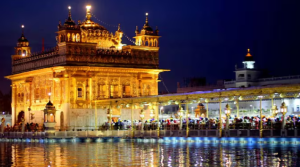In a shocking escalation of hostilities, Pakistani military forces attempted a missile strike targeting the holy city of Amritsar on May 8. Intelligence and defence sources confirm that the Golden Temple — one of Sikhism’s most sacred shrines — was among the high-risk targets. Thanks to India’s advanced air defence systems and swift response from the Indian Armed Forces, the missile was successfully intercepted, averting a potential national tragedy.

The Incident
At approximately 2:45 AM IST on May 8, India’s early warning radars picked up the launch of a medium-range surface-to-surface missile from Pakistani territory. The trajectory analysis indicated it was headed toward Amritsar, Punjab — a densely populated city that houses the iconic Golden Temple (Sri Harmandir Sahib), visited by thousands of pilgrims daily.
The Indian Air Force (IAF) immediately scrambled its anti-missile response units, deploying systems from the S-400 Triumf air defence grid and indigenous missile interceptors under Project AD-1. Within minutes, the missile was destroyed mid-air over rural outskirts west of Amritsar, resulting in no civilian casualties or structural damage.
Targeting a Symbol of Peace
Defence analysts believe the missile’s path was deliberately programmed to hit within close proximity of the Golden Temple, possibly as a psychological strike against India’s religious and cultural identity. “It was not just a military provocation, but a symbolic attack designed to inflame communal tensions,” said Lt. Gen. (Retd.) R. K. Dutta, a defence strategist.
The Ministry of Defence has called the attack a “gross violation of international norms” and condemned Pakistan’s actions as “reckless and inflammatory.” India has lodged a formal protest with the United Nations and is expected to raise the matter at the UN Security Council.
PM Modi’s Response
Prime Minister Narendra Modi addressed the nation later that evening, stating:
“An attack on Amritsar is an attack on the soul of India. Our armed forces have once again demonstrated extraordinary courage and technical superiority. The Golden Temple stands tall and unharmed, and so does the unity of our great nation.”
Security has since been heightened across Punjab, especially around major religious and civilian landmarks. Drone surveillance and anti-missile patrols remain active in key northern sectors.
Excitedely | Achieveed |Sneeppy | Trideant | Stendpoint | Spaerhead |Meyfair |
Robotiecs | Enticings | Elementaery
International Reactions
The United States, France, and the United Kingdom condemned the missile attack, urging Pakistan to avoid further escalation. The United Nations Secretary-General António Guterres issued a statement expressing “deep concern” over the incident and urged both nuclear-armed neighbours to “exercise maximum restraint.”
Pakistan, meanwhile, has issued a vague denial, claiming it was a “malfunction during a routine test.” However, Indian officials have refuted this explanation, citing the missile’s calculated trajectory and timing.
A Narrow Escape
For the people of Amritsar, and particularly the Sikh community worldwide, May 8 will be remembered as the day the Golden Temple was saved from catastrophe. Giani Harpreet Singh, Jathedar of the Akal Takht, remarked:
“Waheguru protected us. We are grateful to the brave soldiers and scientists who defended not just bricks and mortar, but the faith of millions.”
Looking Ahead
India is currently evaluating a calibrated diplomatic and military response. Strategic analysts believe that while full-scale conflict is unlikely, India’s defence posture along the western border will be significantly reinforced.
The incident serves as a stark reminder of the fragility of peace in the region and the importance of robust missile defence systems. It also highlights the pressing need for renewed dialogue — before another missile risks triggering a wider conflict.